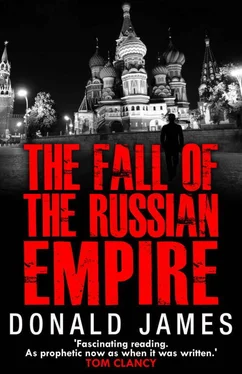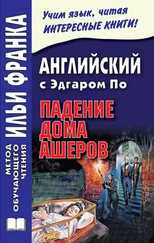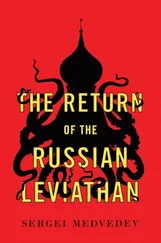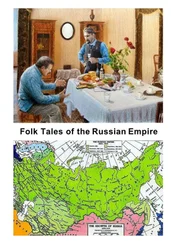From beyond the embassy walls the Englishman and American could see the dawn light rising above the city. As the last bus drove into the courtyard the senior embassy staff from half a dozen Western embassies, including two ambassadors, straggled across the courtyard while Jack Bennerman checked off names.
Near the end of the line Tom Yates was walking with Harriet, both hauling heavy leather suitcases.
“Where’s Carole?” David Butler asked, looking quickly down the line.
Tom Yates’ face was set. “She’s not coming.”
“What the hell do you mean, she’s not coming?” Bennerman said.
“She’s not coming, that’s what he means. She’s staying in Russia with her Russian,” Harriet snapped nervously. “Now for God’s sake, let’s get aboard.” She hurried forward.
Yates watched the other two men hesitate. “What is it?” he said bitterly. “Are you both in love with her too?”
* * *
Past the Pavelets Station Carole took the Varshovskoye Shosse, then drove south on Highway 5 toward Podolsk.
She was still shaking from what she had heard at Letsukov’s apartment. While she was hammering on the door a stranger had wrenched it open angrily. He had stood barefoot in an unbuttoned lumberjack shirt and baggy gray trousers staring at the obviously distraught Westerner opposite him.
When she asked for Letsukov the man had snorted angrily, “It’s we who live here now,” and he gestured to an unseen family behind him. “The old occupant’s gone.”
“Where, do you know where?”
Behind the man’s head she saw a militia uniform hanging on the cupboard door.
“Where he ought to have been a long time ago is my guess,” the man said and closed the door in her face.
There was no traffic on the southern road but the snow was thick and uncleared and she felt she was making agonizingly slow progress. Yet during the afternoon she had reached Podolsk and followed the railway track to the station where Letsukov had met her. For an hour after that in the almost deserted town she had driven through the suburbs looking for the old nineteenth-century Singer Sewing Machine Company building and only as the factory’s English sign stood out against the last pink streaks of daylight did she know she was on the right road.
Yet there were still another two hours of false turnings before she found the crossroads where she had last seen Letsukov, and another three or four miles along the lane she had finally abandoned the car.
Without snowshoes, sinking in the deep drifts almost to her waist, Carole had been in a state of collapse when Kitty and Volodya pulled her into the hut.
While Volodya took off her coat, Kitty wrapped her in a blanket and dragged her chair closer to the stove.
“He was arrested last week,” Kitty said. “Just after you were here.” She brought a glass of tea and placed it carefully between Carole’s hands.
“As far as we can understand,” Volodya said, “he was arrested for something to do with a fire at his office.”
“Do they know about the newspaper?”
“It won’t take them long to make the connection. We’re moving the presses tonight,” Kitty said.
The hot tea burned her fingers. “Do you know where he’s being held?” Carole asked.
“At the Lubyanka,” Volodya said shortly.
“He’s being questioned?”
They both nodded.
“Tortured you mean?” Carole said. She was shivering too much to hold the tea and Kitty stepped forward and took it from her.
Kitty placed the glass of tea on the stove-top and looked up at her husband. “You can tell her,” she said. “There can be no harm now. Not now that we’re just leaving ourselves.”
Volodya hesitated. “Do you remember us talking of a man named Joseph Densky?”
“Yes. He’s in prison in Leningrad.”
“No longer. Joseph Densky is now in Moscow. He has called on every Moscow worker to demonstrate tomorrow night. ‘Have courage,’ he said. ‘No one can guess what Moscow or even Russia will be the next morning.’”
The morning wore on and the Gulag Regiments marched and sang through the thickening eastern suburbs of Moscow. Women hung from their tower-block windows and men on the street watched silently. But all through that long morning there were no incidents as nearly 150,000 men passed through the first suburban villages of the capital.
At Balashika they stopped. In the drab factory suburb the field kitchens were set up along the highway.
Before this day the Balashika suburb had little claim to fame. Its industries were electrical and railway engineering. The new soap factory infused the area with an uncertain, sweet-putrid odor and the workers lived in concrete apartments among graffiti, peeling paint and abandoned, rusting junk. It was no worse than Glasgow, South Chicago or Nanterre, but it fell far short of a brave new world.
Still the Gulag Regiments might have passed peacefully through Balashika if one of the Tajik regiments had not seen signs in their national language over a gateway in a long anonymous brick wall in the back streets behind the main highway.
A few of the more energetic spirits had rattled the gates and pressed their faces between the bars and yelled “ Salom … Salom .”
At first the low barrack-like blocks had remained silent, apparently empty, then a window had opened and a smiling face appeared shouting “ Salom ” in response.
“Hasan Rudaki!” the penals had called. Other windows opened. “Hasan Rudaki!” men shouted down in reply.
As the tenth-century founder of Tajik national literature Rudaki’s name had become a battle cry for Tajik independence.
A great crowd of penals was now gathering round the barrack gates. One man clambered up the ironwork and dropped down the other side. Others followed. Soon there were fifty or sixty in the courtyard, dancing and singing Tajik songs.
“Come and join us, Brothers,” they invited the conscripts. “We’re on our way home, Brothers, come home with us!”
In the headquarter block the Russian colonel and staff of the newly formed Tajik Artillery Training Regiment phoned the militia post at Balashika center. He described the situation at the barracks and requested aid before it got out of hand.
The local militia officer ordered his full force of forty men into their personnel carriers. He knew no way to avoid the request. Yet he could guess what effect militia armored vehicles would have on the penals. With their 30-millimeter guns loaded with riot control gas shells and the men in plastic visors beneath their steel helmets the five vehicles drove by side streets to the barracks.
There is no available account of the next hour. The only thing certain is the outcome. By midday when the Gulag Regimental commanders managed to restore order among their men, the armored vehicles of the militia were burning in the courtyard, the Russian staff had been stripped to their underpants and now huddled fearfully in the snow, and the armory had been broken open and looted. Rifles, light machine guns and ammunition were seized by the Gulag penals. More significantly, three batteries of old German 88 guns, the deadly infantry support artillery of Hitler’s Wehrmacht, were hauled out and linked up to tow trucks.
It was early afternoon when the ragged army got onto the road again and the mood had changed. The Baltic formations — Latvians, Estonians and Lithuanians — took the lead. Of all the Gulag Regiments they were the most fiercely anti-Russian. Among them there was no laughter and no songs. Six miles ahead, on the road to the city, a screen of armed militia lay in wait.
* * *
The great Trinity Monastery of Saint Sergei dominates the town of Zagorsk, 45 miles north of Moscow. Three hundred yards long and over half as wide, its walls contain two cathedrals and half a dozen churches and chapels. Founded by Saint Sergei in 1345, the monastery was besieged in the Tatar invasions of the next century. It was now a quiet lamp-lit precinct in the middle of Zagorsk, its painted churches and domed cathedrals a secure enclave of old Russia within its walls.
Читать дальше












